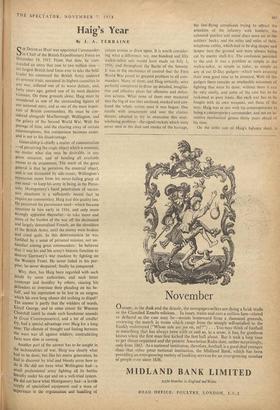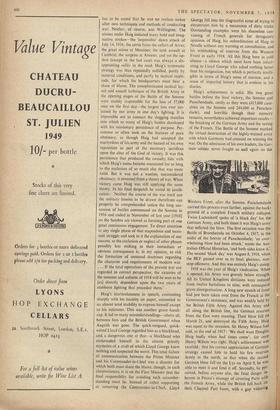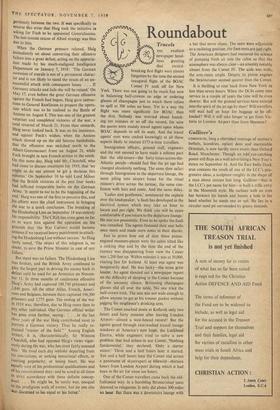Haig's Year
By 3. A. TERRA1NE Q ra DOUGLAS HAIG was appointed Commander- 1...) in-Chief of the British Expeditionary Force on December 19, 1915. From that date, he corn- thanded an army that rose to two million men- th2 largest British land force ever to take the field. Under his command the British Army endured its severest trials, sustained its highest casualties in any war, suffered one of its worst defeats, and, fully years ago, gained one of its most decisive victories. On these grounds alone, Haig must be considered as one of the outstanding figures of our national story, and as one of the most impor- tant of British commanders. He must be con- sidered alongside Marlborough, Wellington, and the galaxy of the Second World War. With the passage of time, and the clearing away of certain misconceptions, this comparison becomes easier, and is not to his disadvantage.
Generalship is chiefly a matter of concentration —of perceiving the single object which is essential, no matter what else may be desirable, in any given situation, and of bending all available means to its attainment. The mark of the great general is that he perceives the essential object, and is not distracted by side-issues; Wellington's reputation sterns from his never-failing grasp of one need—to keep his army in being, in the Penin- sula; Montgomery's lucid penetration of succes- sive situations is a sufficiently recent fact to require no commentary. Haig had this quality too. He perceived the paramount need—which became apparent to him early in 1916, and only more strongly apparent thereafter—to take more and more of the burden of the war off the decimated and largely demoralised French, on the shoulders of the British Army, until the enemy were broken and cried quits. In this determination he was fortified by a sense of personal mission, not un- familiar among great commanders: he believed that was his and his army's historic function to destroy Germany's war machine by fighting on the Western Front, He never failed in his pur- pose; he never despaired; finally he conquered.
Why, then, has Haig been regarded with such doubt by some authorities, and such bitter contempt and hostility by others, causing his defenders to overstate their pleading on his be- half, and his reputation to be lost in an enigma Which his own long silence did nothing to dispel'? The answer is partly that the wielders of words, Lloyd George, and to some extent Sir Winston Churchill (until he made such- handsome amends in Great 'Contemporaries), and a lot of smaller fry, had a special.advantage over Haig for a long time. The climate of thought and feeling between the wars was all against soldiers; contradicting facts were slow in coming.
Another part of the answer has to be sought in the technicalities of war. Haig' saw clearly what had to be done, but like his entire generation, he had to discover by trial and bloody error how to do it. He did not have what Wellington had—a small professional army fighting all its battles literally under his eye and on a well-tried system. He did not have what Montgomery had—a lavish supply of specialised equipment and a store of experience in the organisation and handling of
citizen armies to draw upon. It is worth consider- ing what a difference, say, one hundred and fifty walkie-talkie sets would have made on July 1, 1916, and throughout the Battle of the Somme. it was in the mechanics of control that the First World War posed its greatest problem to all com- manders. Many of them, and Haig certainly, were perfectly competent to draw up detailed, imagina- tive and effective plans for offensive and defen- sive actions. What none of them ever mastered Was the fog of war that enclosed, masked and con- fused the whole action once it was begun. One recalls with amazement and awe the clumsy devices adopted to try to overcome this over- whelming problem—the signal rockets which were never seen in the dust and smoke of the barrage,
the low-flying aeroplanes trying to attract the attention of the infantry with hooters, the coloured patches and metal discs sewn on to the soldiers' backs, and the miles and miles of field- telephone cables, which had to be dug deeper and deeper into the ground and were always being cut by enemy shell-fire. The confusion persisted to the end. It was a problem as simple as the walkie-talkic, as simple as radar, as simple as any of our D-Day gadgets—which were awaiting their own good time to be invented. With all the gadgets there remains an irreducible minimum of lighting that must be done; without them it can be very costly, and some of the cost has to be reckoned as pure waste. But each war has to be fought with its own weapons, not those of the next. Haig was at one with his contemporaries in being a contemporary commander, and not an in- ventive mechanical genius thirty years ahead of his time.
On the debit side of Haig's balance sheet, it
has to be stated that he was no restless seeker after new techniques and methods of conducting war. Neither,, of course, was Wellington. The armies under Haig initiated many bold and imag- inative strokes—the 'impossible' dawn attack of July 14, 1916; the sortie from the cellars of Arras; the great mines at Messines; the tank assault at Cambrai; the surprise at Amiens; and yet the up- shot (except in the last case) was always a dis- appointing ',Wee in the mud. Haig's systematic strategy was thus repeatedly nullified, partly by material conditions, and partly by tactical inepti- tude, for which his headquarters must bear a share of blame. The unsophisticated tactical lay- out and assault technique of the British Army in the opening stages of the Battle of the Somme were mainly responsible for the loss of 57,000 men on the first day—the largest loss ever sus- tained by our army in one day's fighting. It is impossible not to connect the slogging matches into which so many of Haig's battles developed with his missionary persistence of purpose. Per- sistence so often took on the features of pure obstinacy, as though Haig had accepted the martyrdom of his army and the hazard of his own reputation •as part of the necessary sacrifices upon the altar of the God of victory. It was this persistence that produced the casualty lists with which Haig's name became associated for so long to the exclusion of so much else that was more valid. But it was not a wanton, unconsidered obstinacy; it stemmed from a theory of war. When victory came Haig was still applying the same theory. In his final despatch he stated its justifi- cation : 'Neither the course of the war itself nor the military lessons to be drawn therefrom can properly be comprehended unless the long suc- cession of battles commenced on the Somme in 1916 and ended in November of last year [1918] on the Sambre are viewed as forming part of one great continuous engagement. To direct attention to any single phase of that stupendous and inces- sant struggle and seek in it the explanation of our success, to the exclusion or neglect of other phases possibly less striking in their immediate or obvious consequence is, in my opinion, to risk the formation of unsound doctrines regarding the character and requirements of modern war. . . . If the total operations of the present war are regarded in correct perspective, the victories of the summer and autumn of 1918 will be seen to be [as] directly dependent upon the two years. of stubborn fighting that preceded them.'
Haig's inarticulateness in speech, contrasting sharply with his lucidity on paper, amounted to an almost total inability to express himself except to his intimates. This was another grave -handi- cap. It led to many misunderstandings—above all, between him and the British Government when Asquith was gone. The quick-tongued, quick- witted Lloyd George regarded him as a blockhead, and, a dangerous one at that—a blockhead who enshrouded himself in the almost priestly mysteries of a craft of which Lloyd George knew nothing and suspected the worst. This total failure of communication between the Prime Minister and his Commander-in-Chief was ki disaster for which both must share the blame, though, in such circumstances, it is on the First Minister that the final responsiblity for avoiding such misunder- standing must lie. Instead of either supporting or removing the Commander-in-Chief, Lloyd George fell into the disgraceful error of trying to circumvent him by a succession of dirty tricks. Outstanding examples were his shameless can- vassing of French generals for derogatory opinions of Haig, his subordination of Haig to Nivelle without any warning or consultation, and his withholding of reserves from the Western Front in early 1918. All this Haig bore in cold silence—a silence which must have been infuri- ating to Lloyd George who asked nothing better than his resignation, but which is perfectly intelli- gible in terms of Haig's sense of mission, and a sense of impartial history that is evident in his diaries.
Haig's achievement is solid. His two great battles before the final victory, the Somme and Passchendaele, costly as they were (415,000 casu- alties on the Somme and 244,000 at Passchen- daele), and horrible though their memory remains, nevertheless achieved important results— the breaking of the German Army and the saving of the French. The Battle of the Somme marked the virtual destruction of the highly-trained army with which Germany had counted on winning the war. On the admission of his own leaders, the Ger- man soldier never fought so well again on the Western Front, after the Somme. Passchendaele carried this process even farther, against the back- ground of a complet French military collapse. Twice Ludendorff spoke of 'a black day' for the German Army, and both times it was Haig's army that inflicted the blow. The first .occasion was the Battle of Broodseinde on October 4, 1917, in the midst of the horn:it. of Passchendaele; 'an over- whelming blow had been struck,' wrote the Aus- tralian Official Historian, 'and both sides knew it.' The second 'black day' was August 8, 1918, when the 'BEF passed over to its final, glorious, non- stop offensive. And this was entirely Haig's doing.
1918 was the year of Haig's vindication. When it opened, his Army was gravely below strength. All its United Kingdom divisions were reduced from twelve battalions to nine, with consequent grave disorganisation. A long new stretch of front had just been taken over from the French at the Government's insistence, and was weakly held by the British Fifth Army. Against this Army and all along the British line, the. German reserves from the East were massing. Their blow fell on March 21, and destroyed the Fifth Army. Haig was equal to the occasion. Sir Henry Wilson had said, at the end of 1917: 'We shall want Douglas Haig badly when bad times come': for on Henry Wilson was right. Haig's achievement was twofold : first his correct appreciation of German strategy caused hiM to hold his few reserves firmly in the north, so that when the second German blow fell-on the Lys on April 9, he was able to meet it and fend it off. Secondly, he Per- ceived, before anyone else, the fatal danger ill' herent in Petain's strategy of covering Paris with the French Army, while the British fell back on their -Channel Port bases, with a gap widenin$ perilously between the two. It was specifically to reverse this error that Haig took the initiative in asking for Foch to be appointed Generalissimo. The last-minute rescue of Allied strategy was thus due to him.
When the German pressure relaxed, Haig immediately set about converting their offensive failure into a great defeat, acting on the apprecia- tion made by his much-maligned Intelligence Department on January 7, 1918: 'The German accession of morale is not of a permanent charac- ter and is not likely to stand the strain of an un- successful attack with consequent losses. . . . If Germany attacks and fails she will be ruined.' On May 17, even before the great German offensive against the French had begun, Haig gave instruc- tions to General Rawlinson to prepare the opera- tion which was to be realised as the Battle of Amiens on August 8. This was one of the greatest surprises and completest victories of the war, a total reversal of March 21. From then onwards, Haig never looked back. It was on his insistence, and against Foch's wishes, when the Amiens attack slowed up on the old Somme battlefields, that the offensive was switched north to the Albert-Gommecourt front on August 21, while Foch brought in new French armies to the south. On this same day, Haig told Mr., Churchill, who had come to discuss munitions for 1919, that 'we ought to do our utmost to get a decision this autumn,' On September 10 he told Lord Milner that the British victories of the past four weeks had inflicted irreparable harm on the German Army. 'It seems to me to be the beginning of the end.' Haig was one of the first to perceive this, and his efforts were the chief instrument in bringing the war to a quick conclusion. The breaking of the Hindenburg Line on September 18 was entirely his responsibility. The'CIGS has even, gone so far as to warn him against the operation on the grounds that 'the War Cabinet would become anxious if we received heavy punishment in attack- ing the Hindenburg Line without success.' As Haig tartly noted, 'The object of this telegram is, no doubt, to save the Prime Minister in case of any failure.'
But there was no failure. The Hindenburg Line Was broken, and the British Army continued to play the largest part in driving the enemy back in defeat until he sued for an Armistice on Novem- ber I I. In three months of continuous offensive Haig's Army had captured 188,740 prisoners and 2,840 guns. All the other Allies, French, Ameri- cans and Belgians, between them captured 196,500 prisoners and 3,775 guns. The ending of the war in 1918 was, therefore, due to Haig more than to any other individual. One German official writer has gone even further, saying: . . in the last three yeak of the war Haig contributed most to prevent a German victory. Thus he really re- mained "master of the field." ' Among English writers, it is, characteristically, Sir Winston Churchill, who had opposed Haig's views vigor- ously during the war, who has most fairly assessed him : 'He lived each day without departing from his convictions, or seeking sensational effects, or courting popularity, or losing heart. He was equally sure of his professional qualifications and of his constitutional duty: and he acted at all times in strict accordance with these definite concep- tions. . . . He might be, he surely was, unequal to the prodigious scale of events; but no one else was discerned as his equal or his better.'




































 Previous page
Previous page